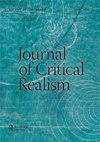When singing strengthens the capacity to aspire: girls’ reflexivity in rural Bangladesh
IF 2.9
0 PHILOSOPHY
引用次数: 2
Abstract
ABSTRACT In the present paper, we explore the impact of singing for girls in rural Bangladesh. Previous findings in this field-based interview study (with 18 girls) have demonstrated that singing can act as a driving force in young girls’ psychological individuation processes, implying increased agency and autonomy. A critical question, however, is to what extent the village girls will manage to maintain a feeling of agency as they pass through puberty. How do they navigate between their own wish to continue singing and pressure from cultural norms (such as getting married)? Using Margareth Archer’s morphogenetic approach and Arjun Appadurai’s approach to culture as a capacity as analytical tools, we connect different modes of reflexivity to the girls’ capacity to aspire. We discuss specific mechanisms that emerge as relevant for the girls/young women as they navigate their way through the Bengali rural society.当歌唱增强了渴望的能力:孟加拉国农村女孩的自反性
摘要在本文中,我们探讨了唱歌对孟加拉国农村女孩的影响。这项基于实地的访谈研究(针对18名女孩)先前的研究结果表明,唱歌可以在年轻女孩的心理个性化过程中发挥驱动力,这意味着增加了能动性和自主性。然而,一个关键的问题是,乡村女孩在经历青春期时,能在多大程度上保持代理感。他们如何在自己继续唱歌的愿望和来自文化规范(如结婚)的压力之间导航?使用Margareth Archer的形态发生方法和Arjun Appadurai的文化方法作为分析工具,我们将不同的自反模式与女孩的渴望能力联系起来。我们讨论了女孩/年轻妇女在孟加拉农村社会中的具体机制。
本文章由计算机程序翻译,如有差异,请以英文原文为准。
求助全文
约1分钟内获得全文
求助全文

 求助内容:
求助内容: 应助结果提醒方式:
应助结果提醒方式:


